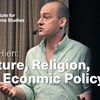religion
Religion and Fertility: A Longitudinal Register Study Examining Differences by Sex, Parity, Partner’s Religion, and Religious Conversion in Finland
European Journal of Population, vol. 40:9 Abstract We use longitudinal data on religious affiliation in Finland to examine childbearing behavior. All analyses are based on detailed fertility information
Divine Placebo: Health and the Evolution of Religion
Human Ecology, 47, 157-163 Abstract In this paper, I draw on knowledge from several disciplines to explicate the potential evolutionary significance of health effects of religiosity. I present three mai
Emmanuel Anati: The Origins of Religion. A Study in Conceptual Anthropology
in: Human Ecology 48. Book review of Emmanuel Anati: The Origins of Religion. A Study in Conceptual Anthropology Read more

Northern Saints and Southern Sinners? Culture, Religion and Economic Policy
Research seminar with Josef Hien, political scientist and researcher at the Institute for Futures Studies. This presentation promotes a novel explanation of the rift between Northern and Southern memb
Religion and mental health in young adulthood: a register-based study on differences by religious affiliation in sickness absence due to mental disorders in Finlan
Epidemiology & Community Health vol. 78, issue 6 Abstract BackgroundReligiosity and spirituality are known to be positively correlated with health. This is the first study to analyse the interrelatio

Sekter och salafister. Inspelning från seminarium om boken Religion tur och retur
Det här är en inspelning av seminariet Sekter och salafister, om "Religion tur och retur", en årsbok från Riksbankens Jubileumsfond. Seminariet hölls på Institutet för Framtidsstudier 6 februari 2018.
Belief Revision for Growing Awareness
Mind 130(520), 2021 Abstract The Bayesian maxim for rational learning could be described asconservative changefrom one probabilistic belief orcredencefunction to another in response to new information. ). But can this conservative-change maxim be extended to revising one’s credences in response to entertaining propositions or concepts of which one was previously unaware? The economists,) make a proposal in this spirit. Philosophers have adopted effectively the same rule: revision in response to growing awareness should not affect the relative probabilities of propositions in one’s ‘old’ epistemic state. The rule is compelling, but only under the assumptions that its advocates introduce. It is not a general requirement of rationality, or so we argue. We provide informal counterexamples. And we show that, when awareness grows, the boundary between one’s ‘old’ and ‘new’ epistemic commitments is blurred. Accordingly, there is no general notion of conservative change in this setting.
The importance of protecting religious buildings in war
It has been a long and violent conflict, but the parties have finally come to an agreement to put down their weapons – now it’s time for peace to settle in society. Unfortunately, there are a limited
Expert deference as a belief revision schema
in Synthese (2020) AbstractWhen an agent learns of an expert’s credence in a proposition about which they are an expert, the agent should defer to the expert and adopt that credence as their own. This
Vaccine confidence is higher in more religious countries
Human vaccines and immunotherapeutics Abstract Vaccine hesitancy is a threat to global health, but it is not ubiquitous; depending on the country, the proportion that have confidence in vaccines ranges








